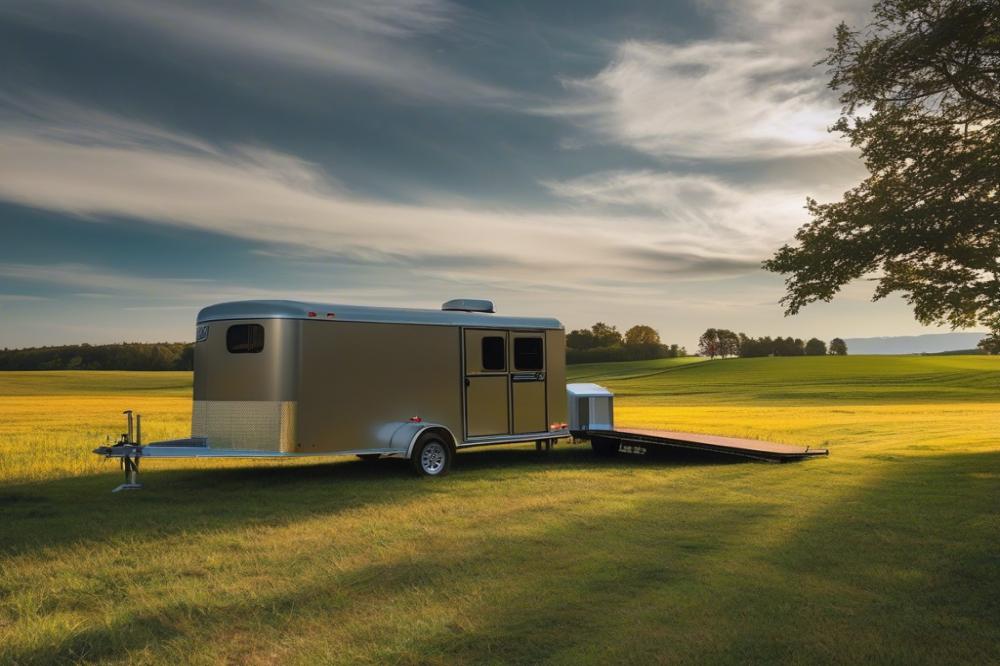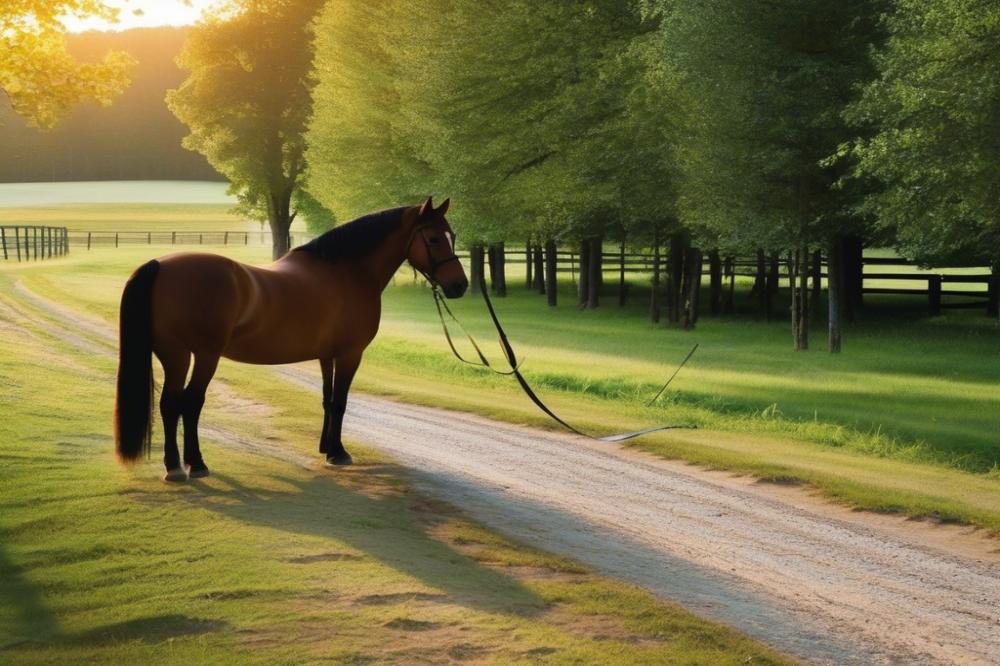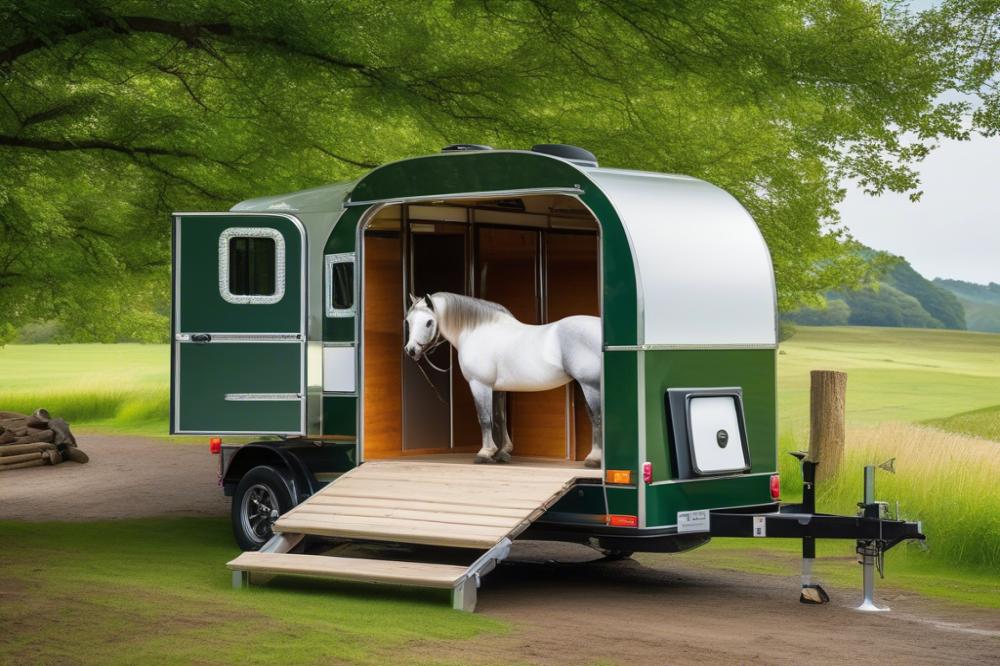Understanding horse anxiety During Travel and How to Reduce It
Traveling can be a daunting experience for horses. Many of them experience significant stress when being transported. Understanding this anxiety is crucial for horse owners and caretakers. It helps create a safe environment during transport and improves the overall experience for the horse.
Horse transport presents many challenges. The transition from familiar surroundings to a new environment can be unsettling. Changes in routine or the sounds of the trailer can heighten their anxiety. Factors like the duration of the journey and the mode of transport contribute to how a horse feels during travel.
The impacts of travel stress on a horse’s wellbeing can be profound. Anxiety can lead to physical issues and behavioral problems. Horses may refuse to eat, exhibit signs of distress, or even injure themselves. These reactions can affect their mental health long after the trip ends. By recognizing and addressing these feelings, owners can make travel a more positive experience for their animals.
Understanding horse anxiety

Definition and Causes of Horse Anxiety
Horse anxiety refers to a state of distress that can occur during travel. Various factors can trigger this condition. For instance, changes in environment, unfamiliar sounds, and tight spaces may all contribute. Some horses might feel anxious due to past traumatic experiences associated with transportation. Others may have temperaments that make them more sensitive to stress. Recognizing these triggers is key to managing their anxiety effectively.
Signs of Anxiety in Horses During Transport
Horses display several signs when they feel anxious during transport. Changes in behavior can include excessive sweating, pacing, or even whinnying. It’s important to pay attention to their body language. Anxious horses often have tense muscles, wide eyes, or pinned ears. They may also become restless or try to escape their surroundings. Noticing these signs early can help in implementing strategies to soothe them.
The Role of equine behavior in Anxiety
Understanding equine behavior plays a crucial role in addressing anxiety. Horses are prey animals and are naturally alert to their surroundings. This instinct can heighten their anxiety in unfamiliar situations. Social structure also affects their behavior. When transported alone, horses may experience increased stress compared to when they travel with companions. Building trust through proper handling can reduce anxiety levels. Familiar routines during travel can also be beneficial. Having a consistent approach to loading and unloading helps them feel secure.
Travel Tips to Reduce Horse Anxiety

Preparing the Horse for Travel
Before heading out, it’s crucial to get your horse ready for travel. Start by checking that your horse is accustomed to being handled. Grooming not only helps them feel comfortable but also establishes a bond. Regular exercise prior to the journey can help release pent-up energy. A calm demeanor from the handler can make a significant difference. Make sure to feed your horse a familiar meal before traveling; sudden changes can upset their stomach. Hydration is important, so offer water as needed. A companion animal can provide reassurance during this process.
Choosing the Right Transport Environment
Selecting an appropriate transport vehicle is essential. Choose a trailer that is spacious enough for the horse to stand comfortably. The area should also be well-ventilated to prevent overheating. Avoid loud and jarring environments. An enclosed space that is plush yet secure can provide a soothing atmosphere. Consider using calming aids, such as special bedding or soothing scents, to promote relaxation. A smooth driving style can help to minimize any bumps and sudden movements.
Importance of Familiarization and Desensitization
Introducing your horse to travel conditions gradually can help. Start with short trips to allow them to adapt to being in a trailer. Gradually increase the distance to build their confidence. Use calm, positive reinforcement during these sessions. This will help the animal associate travel with good experiences. Exposing your horse to various sights and sounds in a controlled setting can further ease anxiety. Leave ample time for your horse to explore new surroundings before any longer journeys. The goal is to make the unfamiliar feel familiar.
Effective Loading Techniques
Strategies for Loading Anxious Horses
Loading an anxious horse can be a daunting task. Start by approaching the horse calmly. Slow movements help convey a sense of safety. It’s crucial to allow the horse time to assess the trailer without feeling rushed. Creating a routine can also be beneficial. Horses often find comfort in predictability. Using familiar items, like a favorite blanket, within the trailer can encourage them to enter.
Use of Positive Reinforcement in Loading
Incorporating positive reinforcement is vital. Treats or praise can motivate horses when they take small steps toward loading. When the horse steps forward, reward them promptly. This connection between action and reward fosters trust. Additionally, it may help to create a calm atmosphere. Soft voices and gentle touches can reassure them. Consider using a buddy system, where a calm companion horse assists in the process.
Tips for Ensuring Safe and Calm Transport
Focusing on safety is essential for any journey. Begin by checking that the trailer is secure and free from hazards. Use non-slip mats inside the trailer to prevent accidents. Make sure the horse is comfortable during transit. A well-fitted halter is important for security, as is proper tying. Horses should have enough space to shift, but not so much that they can fall. Monitoring their behavior through the journey can help identify any signs of distress.
Horse Training for Anxiety Reduction
Traveling can be a stressful experience for horses. Training methods play a significant role in reducing their anxiety before trips. Using desensitization techniques can help make them more comfortable with the trailer. Gradually introducing the horse to the trailer creates familiarity. This slows down their initial fearful reactions.
Incorporating positive reinforcement strengthens the bond between the horse and the trainer. Rewarding calm behavior encourages a sense of safety. This builds trust, allowing the horse to feel more relaxed. Reinforcing good behavior consistently is key. It sets a clear expectation and makes training predictable.
Regular exposure to travel scenarios should be part of a horse’s routine. Frequent, short trips can help them adapt. Varying the routes and destinations keeps experiences fresh. This helps horses become less reactive over time. Such training should happen in low-pressure settings first.
Additionally, integrating calm travel practices is essential. Playing soothing music can create a serene environment in the trailer. Using comfortable padding helps prevent the horse from feeling cramped. Practice loading and unloading calmly at home makes the process smoother. A relaxed horse means a more manageable journey.
Always prioritize a steady routine. Horses thrive on consistency. Unpredictable experiences can ramp up anxiety. Make traveling a normal part of their life. This way, they learn to accept it as just another activity.
Horse Welfare and Mental Health
Understanding travel stress is crucial for improving overall horse welfare. When horses are anxious during journeys, their health can suffer in many ways. Stress affects both their mental state and physical body. A horse’s response to uncomfortable travel can lead to long-term issues, such as digestive problems or a weakened immune system.
Signs of anxiety can be subtle. Over time, if a horse consistently experiences stress while traveling, its overall wellbeing may decline. Difficulty by the horse in adapting to travel may result in behavioral problems, making handling more challenging. Mental strain can also decrease performance in sports and competition.
Maintaining mental health during travel is vital for every horse owner. Preparing the horse before a trip can help. Familiar items, like its favorite blanket or hay, can create a sense of security. Allow plenty of time for breaks during long journeys, too. This reduces the likelihood of anxiety and allows the horse to stretch its legs.
Creating a calm environment within the trailer is essential. Horses benefit from being transported in a quiet space where they can feel safe. Adding mats can help absorb movement and reduce vibrations. Adequate ventilation is another important factor for maintaining comfort.
Grooming before travel is also beneficial. This not only strengthens the bond between horse and handler but can also help soothe nerves. Regular check-ins during the trip can reassure the horse. Voice and touch can be calming signals that promote a sense of safety.
In summary, the connection between travel stress and horse welfare cannot be overlooked. Long-term anxiety can have negative impacts on health. Thus, focusing on best practices can aid in promoting a calm experience. Owners should prioritize their horses’ mental health as much as their physical needs while traveling.
Final Thoughts on Reducing Horse Anxiety During Travel
Traveling can be a stressful experience for horses, and understanding this is the first step in alleviating their anxiety. Recognizing the signs of distress in your horse is essential. Ensuring the animal is comfortable starts with good preparation. Create a calm travel environment by choosing appropriate transportation and providing familiar items, such as blankets or toys. These strategies often help ease their nerves.
Horse owners and transporters should also consider scheduling regular trips that mimic the conditions of actual travel. Familiarity reduces stress. Over time, your equine companion may become accustomed to the process, making it less traumatic. Implementing travel tips, such as short journeys with positive experiences, can build confidence. Don’t hesitate to consult with veterinarians or equine behavior specialists if more help is needed.
Prioritizing animal welfare is crucial in all transport practices. Horses are not just cargo; they have feelings and needs. Taking the time to understand their unique needs can make all the difference. By creating a more supporting environment during transport, everyone involved in the horse’s care can ensure a smoother experience and foster a bond of trust. Remember, a calm horse leads to a calmer journey. Let’s be champions of these wonderful animals and make their travel a more pleasant experience.



